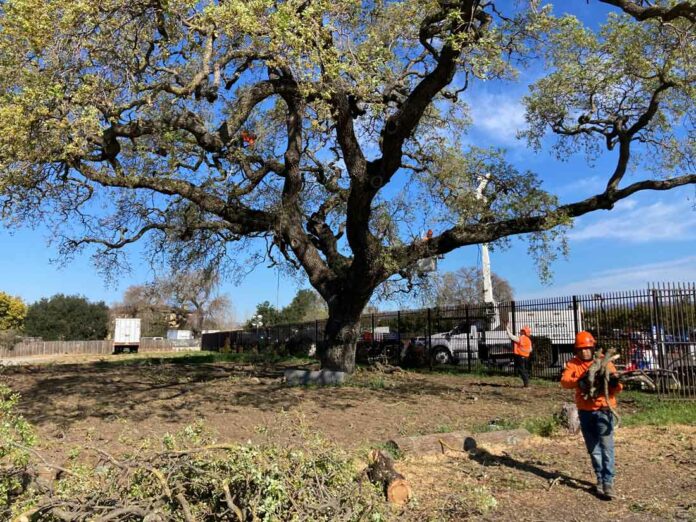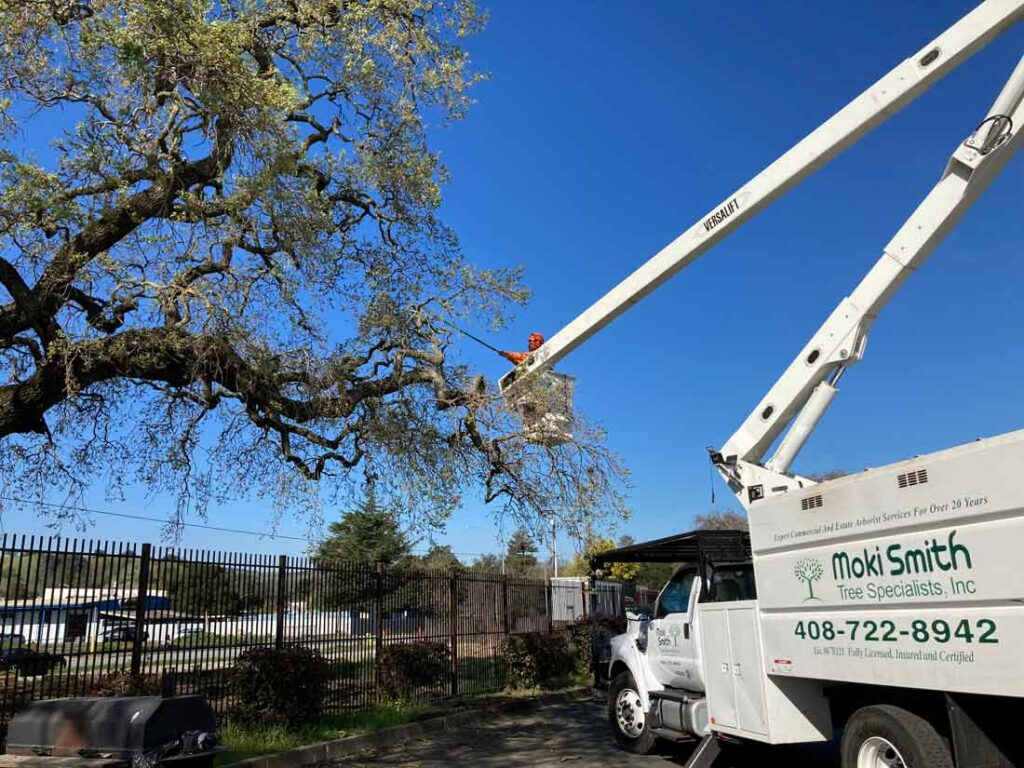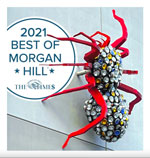
A local tree service, biochemistry company and property owner have been combining their efforts to keep a giant heritage oak tree alive and healthy on the northern edge of downtown Morgan Hill.
On Feb. 18, a crew from Gilroy-based Moki Smith Tree Specialists visited the tree that sits just outside the fence around A Tool Shed, 95 E. Main St., to provide some periodic maintenance. Their work that day consisted of cutting dead branches from the tree’s sprawling canopy and applying fertilizer made by a Morgan Hill company.
“Every few years we come in and when it starts to build up some extra weight we take it off,” said Moki Smith, owner of the tree service. “We just want to make sure the tree doesn’t fail under its own weight, which they often do.”
Smith estimated this particular heritage oak is about 150-175 years old.
The efforts to keep the tree healthy in fact began more than 25 years ago. When Smith started his tree service company in the area in the late 1990s, he and the owner of the A Tool Shed property made an agreement. The tool rental company allowed Smith’s company to use its equipment in exchange for the tree service taking on the task of caring for the heritage oak.
“They agreed to cooperate and do everything we recommended” to keep the tree healthy and alive, Smith said.
One of the first precautions Smith took was to place a barrier around the tree to prevent cars from parking under its branches—thereby preventing the spillage of motor fluids on top of the root system and keeping the soil from becoming too compact.
Then Smith and his crew started aerating the soil around the tree and giving it the nutrients it needed, he said.
“Then we started taking the end weight out of it, the large deadwood, and got it stabilized,” Smith said.
Now, in addition to visiting the tree periodically to identify and remove more dead branches, Smith and his company on Feb. 18 began applying a fertilizer made by Anaerobe Systems to improve the oak’s health. The fertilizer, known as FermeCHAR, uses microbes and “special organisms” to regulate the amount of nitrogen and hydrogen that reach the tree.
Also on Feb. 18, Smith sprayed the tree’s canopy with another organic fertilizer that is also made locally.
“These organisms (from the fertilizers) start to grow and multiply, and this soil environment takes over and pretty soon it just runs on its own,” Smith said. “It’s just giving the trees a little help so they can stay together structurally and stay healthy so they can fight off the types of pathogens and natural enemies they have like fungus, bacteria and insects.”
FermeCHAR is one of a number of similar products made by Anaerobe Systems, which is headquartered on Concord Circle. Anaerobe Systems CEO Mike Cox explained the fertilizer is made entirely from agricultural food waste from farms throughout the region. The chemists at Anaerobe Systems process the waste through a fermentation process with the company’s proprietary blend of “magic microbes.”
The end result is organic fertilizer that is more efficient and cleaner for the environment than synthetic products, Cox said. Some of his biggest customers are other commercial farmers in the South Valley.
“The beauty of this is, it’s much healthier for the plant, and it’s sustainable and environmentally positive,” Cox said.
The solid FermeCHAR fertilizer also includes material known as “biochar,” a carbon-rich biomass material that is made of charcoal and can be used as a soil conditioner.
“It’s a lot more than fertilizer because the microbes play a role, and produce plant growth hormones,” Cox said. “They’re also helping protect the plants from disease, and all this is scientifically documented.”
Cox and Smith clearly share similar ideas about environmental sustainability as a high priority in their respective lines of work.
Smith also notes that it’s simply good for the world and society to keep as many trees healthy as possible. A heritage oak with a massive canopy like the one outside A Tool Shed is an ecosystem within itself, providing habitat for many species.
Such a resource cannot be replaced if it dies, Smith explained.
“Studies show that having trees around, seeing them, and being around them makes you more relaxed,” Smith said. “They’ve been able to track everything from crime rates to scholastic accomplishments based on the amount of trees and vegetation in a community. So we’re just trying to keep some of these beautiful old oak trees in the best condition we can.”








